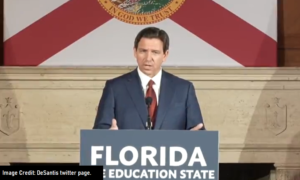
Pensions and Institutional Investors Plan for a Possible Ron DeSantis Win
Posted on 05/25/2023
The upcoming U.S. presidential election is getting electrified as more heavyweights pile in. U.S. President Joe Biden’s approval rating has sunk to an all-time low in April 2023. Biden is 80 years’ old and his party’s early supporters are keeping a greater political distance. Key people from his administration have jumped ship. At the same time, former U.S. President Donald Trump is attempting to take all the media and attention oxygen out of the room, with his widely watched CNN townhall event. Trump will likely continue to get press as the federal government and other city governments pursue legal attacks and investigations on the former U.S. president. In the April 2023 Gallup poll, just 37% of U.S. adults approved of Biden’s job performance, the lowest the polling outfit has measured since the start of his presidency. The poll was conducted between April 3-25, 2023. In another left-wing oriented poll, Trump outperformed Biden.
On May 24, 2023, Florida Governor Ron Desantis threw his hat into the GOP presidential nominee ring via Twitter Spaces. Desantis faces off against Trump and other republican contenders such as former South Carolina Governor Nikki Haley, U.S. Senator Tim Scott, and Vivek Ramaswamy. However, more than 8 in 10 Republican respondents say they are either supporting former President Trump or Florida Governor Ron DeSantis for the GOP nomination for president in 2024 or are open to doing so, according to a CNN poll. In addition, some polling experts predict DeSantis could likely win back red states such as Georgia and Arizona, thus possibly securing the U.S. presidency.
Large asset owners like CPP Investments and some sovereign wealth funds are already weighted strongly to the U.S., but that might increase with a different administration.
What Can Institutional Investors Expect?
1. ESG Wokeness Could Die from the Government Level
Florida Governor Ron DeSantis is the chairman of the Florida State Board of Administration (SBA), which appoints officials who make and approve investments for the state’s US$ 180 billion retirement fund. If elected president, DeSantis would likely halt the aggressive ESG push from the U.S. federal level and other U.S. financial institutions that are based in New York. DeSantis could reverse the rule, “Prudence and Loyalty in Selecting Plan Investments and Exercising Shareholder Rights,” following Biden Executive Order 14030, which was signed by President Biden on May 20, 2021. The order directs the federal government to identify and assess policies to protect the life savings and pensions of America’s workers and families from the threats of climate-related financial risk. DeSantis also signed against social credit scores.
2. Steady Government and Reduced Regulation in Certain Industries
Observers have watched DeSantis run Florida’s government as he worked with state legislators to get laws passed. DeSantis would likely draw less attention from the media compared to Trump, while being able to pull the levers of government to achieve his administration’s goals. This would likely enable foreign and domestic investors to continue to invest in U.S. stocks, bonds, and other assets. DeSantis would likely pursue Trump’s policies of reducing regulations in certain industries.
3. Communist China Relations
DeSantis signed a law that bars Chinese citizens who are not United States citizens from purchasing homes in Florida, with few exceptions. It imposes similar but less stringent restrictions on citizens of Cuba, Venezuela, Syria, Iran, Russia, and North Korea. DeSantis would likely pursue both Trump and to an extent Biden on America First policies against countries such as China. Investors will likely expect tit-for-tat policies between the two major countries. Already Canadian pensions and North America-aligned asset owners began reducing their exposure to mainland China during the COVID-19 pandemic.
4. Big Tech Regulation
With the cat out of the bag, both the GOP and Democrats have agreed that “big tech” got too big. In this scenario, tech mergers and AI regulation will face heat if either Biden, Trump, or Desantis clinches the presidency for the election.
5. Solar and Wind Could Be Deeply Impacted
The renewables handout under Biden’s “Inflation-Reduction Act” was signed into law amid historically high levels of inflation. The law allocated US$ 369 billion toward climate and energy policies among other items. European asset owners and fund managers who have scooped up loads of renewable assets might find their investments worth less, as higher costs of refinancing happened so far in 2023, while tax breaks and credits might be gone.
All this is happening as Fitch Ratings on May 24th places United States’ AAA rating on negative watch. Biden has still not made a deal with House republicans on the debt ceiling.
